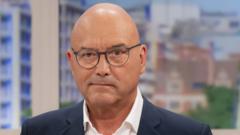MasterChef returns with sacked hosts but without their jokes

John Torode, left, and Gregg Wallace have presented MasterChef since 2005
- Published
MasterChef has returned to TV screens with the launch of a new series that was filmed before hosts Gregg Wallace and John Torode were sacked.
The pair were both fired last month after a report into conduct on the cooking show upheld allegations against them.
The BBC decided to still show this year's amateur series, saying it was "the right thing to do" for the chefs who took part. But it faced a backlash from some women who came forward, while former Celebrity MasterChef contestant Kirsty Wark suggested the BBC could have refilmed the series without the two co-hosts.
Both presenters appear from the outset and throughout the episodes, but they appear to have been edited to include fewer jokes than usual and less chat between them and the chefs.
The first three episodes were released on iPlayer on Wednesday morning, with the series opener broadcast on BBC One at 20:00 BST.
Speaking to BBC Breakfast, Culture Secretary Lisa Nandy said as a viewer, she too "certainly won't be watching it", but that it wasn't her place to tell broadcasters what they could or couldn't show.
Wallace will be replaced by Irish chef Anna Haugh in the final episodes of the series, because the allegations against him - revealed by BBC News - first emerged during filming in November.
In previous years, Wallace and Torode have been a near-constant presence throughout the episodes.
And in the first episode of the new series, they welcome the new contestants, introduce the challenges, interview the chefs while they cook, announce when "time's up", and taste the dishes.
But there are fewer jokes, with the usual banter between the presenters and the chefs appearing to have been reduced.
'It feels really different'
"There's not really any jokes and chat is kept to a minimum," TV critic Scott Bryan said of the new episodes.
"John and Gregg are there to explain things to camera, link parts of the programme and review the food, but they're not there so much for our entertainment."
His views were echoed by Charlie Beckett, a former programme editor at BBC News and Channel 4 News, who told BBC Radio 5 Live: "If you've never seen MasterChef before, you'd just think it's a pretty ordinary, regular cooking programme. It works perfectly well.
"But there is much less of the banter from the presenters. So it works, but for regular viewers they probably will see that it feels really different."
The promotional image on iPlayer shows the trophy rather than the presenters, unlike in recent years.
Six chefs feature in the first episode, with the next episodes set to introduce a new set of contestants.
Wark 'won't be watching'
Last week, one of the contestants on the new series of MasterChef said she was edited out after asking for it not to be broadcast.
Sarah Shafi told BBC Newsnight that "in an ideal world, what would have happened is that it would have been axed" out of respect to those people whose complaints were upheld.
Her comments came as the BBC faced mounting pressure to reconsider airing the series.
Broadcast union Bectu said bad behaviour "should not be rewarded with prime-time coverage", while a leading women's rights charity warned many people would feel "deeply uncomfortable" to see the show on their TV screens.
Some of the women who made allegations against Wallace have also told BBC News they didn't think it should be aired, with one saying it showed "a blatant disregard for the people who have come forward".
Wark, who told BBC News last November that Wallace had told "sexualised" jokes while filming Celebrity MasterChef in 2011, said she knew many women had asked the BBC not to broadcast the new series.
Speaking to the BBC's Scotcast podcast, she asked: "It could, I suppose, just have gone out on iPlayer, and would that make any difference?"
Not screening it "would have been a terrible shame for all the contestants, but they could have done it all again", she continued, adding: "I probably won't be watching."
Upheld complaints
The controversy over MasterChef started last year, when BBC News first revealed claims of misconduct against Wallace.
In July, a report by the show's production company Banijay revealed that 83 complaints had been made against Wallace with more than 40 upheld, including one of unwelcome physical contact and another three of being in a state of undress.
He has insisted he was cleared of "the most serious and sensational allegations".
In a recent interview, external with The Sun, he said he was "so sorry" to anyone he hurt, but insisted that he was "not a groper, a sex pest or a flasher".
The upheld complaint against Torode related to a severely offensive racist term allegedly used on the set of MasterChef in 2018.
The presenter said he had "no recollection" of it and that any racist language is "wholly unacceptable".
In her interview on Wednesday, the culture secretary weighed in on the scandals involving the presenters, saying: "Like every member of the public, I'm absolutely appalled that that was allowed to happen in plain sight for far too long."
But she also applauded the BBC for signing up to a new watchdog designed to improve standards in the creative industries.
"I think the BBC has shown leadership on this and I would urge other people to follow suit," she said.
'Bitter aftertaste'
The BBC previously said it had not been "an easy decision" to run the series, adding that there was "widespread support" among the chefs for it going ahead.
“In showing the series, which was filmed last year, it in no way diminishes our view of the seriousness of the upheld findings against both presenters,” it said.
"However, we believe that broadcasting this series is the right thing to do for these cooks who have given so much to the process. We want them to be properly recognised and give the audience the choice to watch the series."
In a review, the Telegraph's critic Ed Cumming wrote, external: "To show how seriously the BBC takes the allegations against the presenters, they have edited out their jokes." The resulting series "lacks pizzazz", he said.
The Standard's Vicky Jessop wrote, external: "No jokes here – the production team presumably being terrified that anything either of them says would be taken the wrong way."
The first episode "left a slightly sour taste in the mouth", she added - a sentiment echoed by the Independent's Nick Hilton, external, who wrote that the series is "tinged with a strange, bitter aftertaste".
Additional reporting by Emmanuella Alausa.
Get in touch
Have you been affected by the issues in this story? If you feel able to do so please get in touch
Related topics
- Published19 July
- Published8 July
- Published15 July


